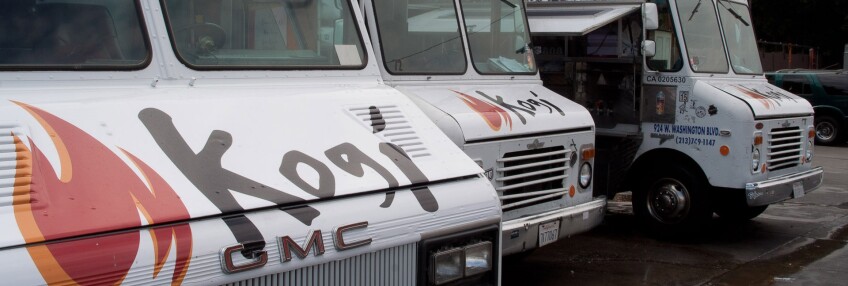A Look Back at Roy Choi’s Early Kogi BBQ Days and His Bold Sauces

A lot has happened to Roy Choi over the last eight years since his humble Kogi BBQ lonchera first hit the streets of Los Angeles. For a chef who has been known to make waves — from popularizing a fervent food-truck movement in the city’s culinary landscape, to starting a revolution in food and social justice — he hasn’t forgotten his roots and bold sauces that have paved the path to where he is today.
Choi says sauces are the cornerstone of what he does, referencing Kogi’s salsa roja and verde that accompany his Korean-inspired street food, like gochujang-slathered pork tacos. “Every chef has their own thing, like some chefs don’t like to over-sauce their stuff because they like precision,” he says. “Me? I like dumping a gallon of sauce on things because I love slurping it up.”
He recalls how a lot of early complaints about Kogi was how there was too much sauce on the tacos and you couldn’t taste the meat. “But that was exactly how I wanted it,” Choi says.
Even before Choi attended culinary school or began working in fine dining kitchens, he would eat at restaurants and flood his plates with every single condiment available; at a Chinese joint, you’d most likely find his dish with pools of chili garlic, soy sauce and hoisin. “I used to drink Tabasco and Tapatio,” he says. “I’d take shots of it, literally.”

Sauces to Choi was more than just something that complemented his food, it was a new way for him to express himself. Right before opening Kogi, he had just lost his job, and launching the food truck signified a moment in his life where everything was changing. “It gave me the freedom to kind of just pull everything together — even places you weren’t thinking of — [like] all my life experiences, all the nerdy things that I loved growing up with, all the weird, idiosyncratic things that I loved, all the nuances, all the weird stuff, all these things, these feelings,” Choi says. “I was able to cull all that together and just make the sauce. It was a very non-cerebral sauce. It was just more of an expression, kind of like a painting; it was more of an expression of that moment and everything that led to that moment. Coincidentally, it tasted like Los Angeles.”
It also tasted like freedom, he says.
Looking back to those early days, Choi and his partners were just trying to get by, without really thinking much about where they were headed. “The first month and a half was just searching for people to eat our food,” he says. “Then it hit, and then there were thousands of people in line in the street and it was just trying to keep up and waking up in the morning and prepping and going back out. That was so fun — it was so pure and simple at that time.”

But then something clicked in Choi. Before Kogi, he had always considered himself a salaryman, someone who’d go to work, collect a paycheck and wait for two weeks of vacation. Opening a business wasn’t in his wheelhouse at the time, but then, “my eyes [became] open to the opportunities,” he says. “Once that did happen, it opens a whole new sonar within you and you start to attract different things and you start to connect to different things.”
Choi says he never really had money, investors or capital, up until he co-launched LocoL with San Francisco chef Daniel Patterson. All of Choi’s projects have mostly been the result of organic collaborations. Now his restaurant empire has expanded to Chego!, POT and Commissary at The Line Hotel, A-Frame, and a brick-and-mortar Kogi BBQ.
Choi sees his future aligning with a similar ethos behind LocoL, his restaurant chain that aims to bring healthful fast food to underserved communities like Watts. He wants to create a nonprofit, possibly named the “Papi Chulo Foundation” — a reference to his nickname — so he can raise funds to build better futures for children and neighborhoods, and use it as a vehicle to speak up for minorities and immigrants. He wouldn’t mind having his own TV show, either.
“I guess where I see the next 10 years, I’m ready to rep the underground while move to the big stage while still be underground but have all the platforms — from financial to media to food to restaurants to whatever — to be able to affect change in a lot of people,” Choi says. “So, look out Wolfgang, look out Emeril, look out Mario, look out whatever man, I’m coming at you!”

Top photo: Courtesy of Kogi BBQ


